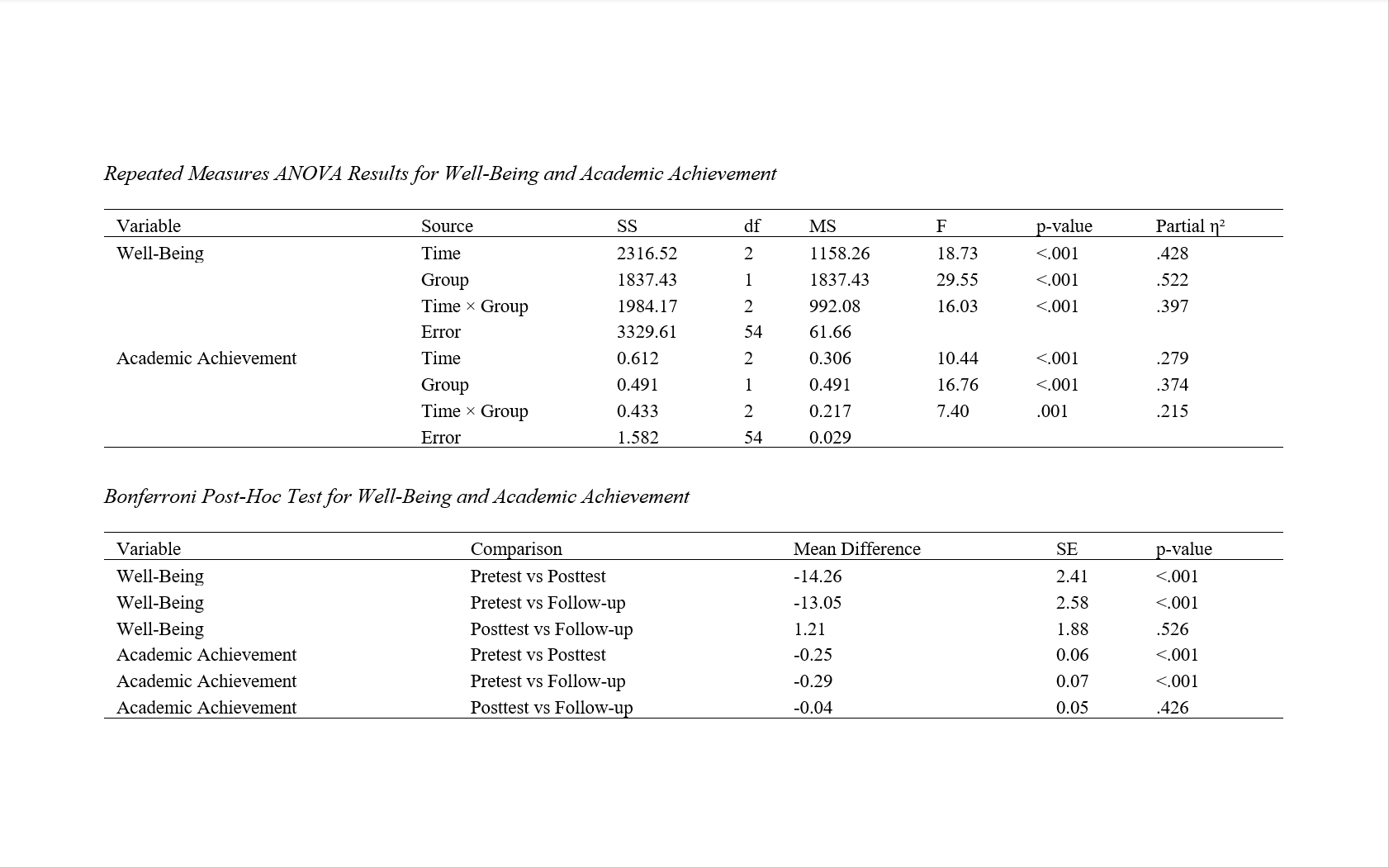Effectiveness of a Gratitude Journal Intervention on Well-Being and Academic Achievement
Keywords:
gratitude journaling, well-being, academic achievement, university studentsAbstract
Objective: This study aimed to examine the effectiveness of a structured gratitude journal intervention on enhancing well-being and academic achievement among university students.
Methods and Materials: A randomized controlled trial was conducted with 30 undergraduate students from Greece, who were randomly assigned to either an experimental group (n = 15) receiving a ten-session gratitude journaling intervention over five weeks or a control group (n = 15) receiving no intervention. Assessments were conducted at three time points: pretest, posttest, and five-month follow-up. Well-being was measured using the Ryff Scales of Psychological Well-Being (RPWB), and academic achievement was assessed via self-reported Grade Point Average (GPA), cross-verified with institutional records. Repeated measures ANOVA and Bonferroni post-hoc tests were used to analyze the data using SPSS-27.
Findings: The results indicated significant improvements in well-being and academic achievement in the experimental group compared to the control group. The mean well-being score in the experimental group increased from 158.42 (SD = 12.35) at pretest to 172.68 (SD = 11.14) at posttest and remained high at follow-up (M = 171.47, SD = 11.92), while the control group showed no meaningful change. Academic achievement also improved significantly in the experimental group, with GPA rising from 2.89 (SD = 0.24) at pretest to 3.18 (SD = 0.21) at follow-up. Repeated measures ANOVA revealed significant time × group interactions for both variables (p < .001), and Bonferroni post-hoc tests confirmed that gains were maintained over time.
Conclusion: The findings suggest that gratitude journaling is an effective and sustainable intervention for improving psychological well-being and academic performance in university students, with benefits persisting up to five months after the intervention.
Downloads
References
Abadali, K. R., Asatsa, S., & Ntaragwe, M. (2021). Adolescents' Social Networking and Self-Concept in Public Mixed Day Secondary Schools in Kajiado North Sub-County, Kenya. International Journal of Research and Innovation in Social Science, 05(07), 841-847. https://doi.org/10.47772/ijriss.2021.5745
Bosacki, S. (2022). Multifaceted Silences in Adolescence. 151-161. https://doi.org/10.5040/9781350162181.0022
Bosacki, S. (2024). Solitude, Silence and Loneliness in Adolescence. https://doi.org/10.5040/9781350345690
Cole, M., & Higgins, J. P. T. (2023). Self-Silencing. 61-68. https://doi.org/10.4324/9781003296683-8
Dedahanov, A. T., Abdurazzakov, O. S., Fayzullaev, A. K. u., & Sun, W. (2021). When Does Abusive Supervision Foster Ineffectual and Defensive Silence? Employee Self-Efficacy and Fear as Contingencies. Sustainability, 14(1), 231. https://doi.org/10.3390/su14010231
Emran, A., Iqbal, N., & Dar, K. A. (2022). Attachment Orientation and Depression: A Moderated Mediation Model of Self-Silencing and Gender Differences. International Journal of Social Psychiatry, 69(1), 173-181. https://doi.org/10.1177/00207640221074919
Fortin, L., Jean-Thorn, A., Allard-Cobetto, P., Théorêt, V., & Hébert, M. (2024). The Interplay of Self-Esteem in the Relationship Between Sexual Dating Violence and Self-Silencing in Adolescent Girls. Partner Abuse, 15(4), 511-523. https://doi.org/10.1891/pa-2023-0061
Goldner, L., Jakobi, C. D., Schorr, S., Dakak, S., & Shawahne, N. (2022). Keep It Quiet: Mother–daughter Parentification and Difficulties in Separation–individuation Shaping Daughters’ Authentic/True Self and Self-Silencing: A Mediation Model. Psychoanalytic Psychology, 39(2), 165-174. https://doi.org/10.1037/pap0000352
Jakubowski, K. P., Barinas‐Mitchell, E., Chang, Y. F., Maki, P. M., Matthews, K. A., & Thurston, R. C. (2021). The Cardiovascular Cost of Silence: Relationships Between Self-Silencing and Carotid Atherosclerosis in Midlife Women. Annals of Behavioral Medicine, 56(3), 282-290. https://doi.org/10.1093/abm/kaab046
Khoza, T. V., & Mokgatle, M. (2023). Maladaptive Behaviours of Maternal Orphans in High Schools of Tshwane North of Gauteng, South Africa. African Journal of Primary Health Care & Family Medicine, 15(1). https://doi.org/10.4102/phcfm.v15i1.3887
LeBlanc, S. S. (2024). Breaking the Cycle: Memorable Messages of “Grin N’ Bear It” and Silence in Menarche Narrative Recall. Qualitative Research in Medicine & Healthcare, 8(2). https://doi.org/10.4081/qrmh.2024.12239
Marettih, A. K. E., Ikhwanisifa, I., Widiningsih, Y., & Yovanny, C. P. (2024). Peran Harga Diri Terhadap Ketidakpuasan Bentuk Tubuh Remaja Perempuan. Psychopolytan Jurnal Psikologi, 8(1), 44-52. https://doi.org/10.36341/psi.v8i1.4213
Monthuy‐Blanc, J., Lemieux, V., Thériault, J., & Rousseau, M. (2020). Exploratory Study: A Blind Integrated School-Based Prevention Program on Eating Disorders and Obesity. Canadian Journal of Community Mental Health, 39(4), 61-84. https://doi.org/10.7870/cjcmh-2020-027
MÜRtezaoĞLu, Ç., & Çıkrıkçı, Ö. (2022). Ergenlerde Mutluluk, Öz-Yeterlik, Akran İlişkileri Ve Sosyal Onay İhtiyacı Arasındaki İlişkilerin İncelenmesi. Erzincan Üniversitesi Eğitim Fakültesi Dergisi, 24(3), 483-498. https://doi.org/10.17556/erziefd.1103962
O’Grady, T. (2023). Infinite Spaces: Kevin Barry’s Lives of Quiet Desperation. 109-129. https://doi.org/10.1007/978-3-031-30455-2_6
Puzio, A., & Best, D. L. (2020). Brief Report: Gender and Ethnicity Predict Adolescent Self‐silencing Above and Beyond Gender Ideology. Journal of adolescence, 84(1), 243-250. https://doi.org/10.1016/j.adolescence.2020.09.011
Ruzibiza, Y. (2021). Silence as Self-Care: Pregnant Adolescents and Adolescent Mothers Concealing Paternity in Mahama Refugee Camp, Rwanda. Sexuality & Culture, 26(3), 994-1011. https://doi.org/10.1007/s12119-021-09928-4
Sheppe, A. H. (2023). The Sound of Silence: Engaging the Quiet Adolescent. Psychodynamic Psychiatry, 51(2), 185-205. https://doi.org/10.1521/pdps.2023.51.2.185
Shrivastava, A. (2021). Self-Silencing With Its Roots in Automatic Thoughts: A Study on Women. Ensemble, 2(2), 249-255. https://doi.org/10.37948/ensemble-2021-0202-a025
Tchidjo, A., & Mgbwa, V. (2020). Sexual Violence, the Law of Silence and Building of Identity Process in the Adolescence. Psycho Affective Analysis of Two Real Life Rape Experiences in Cameroon. Jep. https://doi.org/10.7176/jep/11-28-10
Zimmermann, R., Fürer, L., Schenk, N., Koenig, J., Röth, V., Schlüter-Müller, S., Kaess, M., & Schmeck, K. (2021). Silence in the Psychotherapy of Adolescents With Borderline Personality Pathology. Personality Disorders Theory Research and Treatment, 12(2), 160-170. https://doi.org/10.1037/per0000402
Zuković, S., & Stojadinović, D. (2022). Positive Discipline in the Family as a Resource in the Development of Self-Esteem in Adolescence. Nastava I Vaspitanje, 71(2), 183-197. https://doi.org/10.5937/nasvas2202183z
Zulkefly, N. S., Shakir, A. Y. M., Baharudin, R., Arshat, Z., & Ismail, Z. (2021). Maternal Attachment and Cognitive Distortion of Muslim Adolescents in Juvenile Rehabilitation Residential Schools: Self-Regulation as Mediating Mechanism. Journal of Muslim Mental Health, 15(2). https://doi.org/10.3998/jmmh.415
Иванова, И., Buslaeva, E. Y., & Astahova, L. (2020). The Study of the Readiness of Adolescents to Self-Development in Line With the Existential Approaches in Pedagogy: Results of an Pilot Examination. Applied Psychology and Pedagogy, 5(3), 56-75. https://doi.org/10.12737/2500-0543-2020-46-65

Downloads
Additional Files
Published
Submitted
Revised
Accepted
Issue
Section
License

This work is licensed under a Creative Commons Attribution-NonCommercial 4.0 International License.








